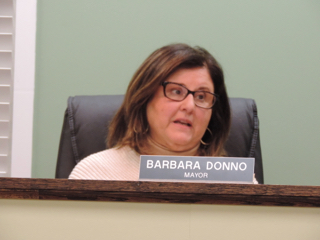By Kristy O’Connell
The Village of Plandome Manor Board of Trustees on Tuesday discussed a proposal to suspend construction of wireless telecommunication towers and facilities in the village.
“This is something we really need to keep an eye on,” Mayor Barbara Donno said.
If the proposal is approved, the village would temporarily suspend permits for the construction of wireless towers and prohibit the approval of any applications.
Donno said applications have recently come through to install 66 cellphone nodes throughout the Town of North Hempstead, 23 of which would be located in Plandome Manor.
The nodes would be placed above telephone poles throughout the community.
According to Rachel Scelfo, an attorney for the village, the village code doesn’t currently address wireless telecommunication towers, nor is there a procedure for processing applications for the installation of such towers.
Scelfo said approval of the law would allow the board to study the issue over the next six months, enabling trustees to better prepare draft legislation and develop procedures that protect the public interest and welfare.
The village’s police power enables the board to take action to protect the health, safety and welfare of residents, Scelfo said.
“We do know that there is radiation that comes off of these nodes,” Donno said, though Scelfo responded that a federal ruling prevents municipalities from using health concerns as a reason for rejecting wireless towers.
Donno said she believes the sudden growth in cellphone nodes is due to the increased demand for more advanced mobile networks.
Though the board cannot officially approve the resolution until the Nassau County Planning Commission approves its request, the proposed law will be revisited at the next board of trustees meeting.
Also on Tuesday, the board approved an amendment to the village code pertaining to excavations, construction and alterations to existing structures, saying that the village does not yet have anything specific in its code about projects within the village’s right of way.
“We’ve had some applications for widening curb cuts, which is in the village’s right of way,” said Scelfo, who also said that people sometimes overlook curbsides as being village property.
The amendment would require a permit to do any work that falls within the village’s right of way, including work on fixtures like utility poles or new additions to existing structures.
Scelfo said the process of requesting a special permit already requires that an application be sent to the village’s building inspector.
This law will “just formalize the process of obtaining a permit to make a structural addition or change in the village’s right of way,” she said.
In other words, each application that the building inspector receives will now also be passed on to the board for further review.
“It just seems our code was lacking in this area, so we are just protecting the village,” Donno said.



